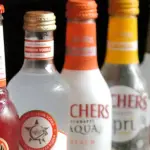
Critics of alcopops have long complained that they encourage and facilitate drinking amongst teenagers. Since alcopops are sweet in flavour and often mask the strong taste of alcohol, this enhances their appeal to younger drinkers – including those under the legal drinking age of eighteen. In a study completed by CHOICE in 2008, a quarter of teenagers could not differentiate between alcopops and non-alcoholic soft drinks. Another national survey found a significant majority of sixteen-year-olds (86 percent) and seventeen-year-olds (96 percent) had consumed alcohol at least once. About 40 percent of underage drinkers consume alcohol at dangerous levels, classified as binge drinking. The dramatic rise in the sale of alcopops has been linked to teenage binge drinking, though this connection is unclear. What is certain is that some alcopop manufacturers have marketed their product with teenagers in mind. Alcopop advertising in cinemas, glossy magazines and teen-friendly websites such as girl.com.au has invited some controversy.
In April 2008 the newly-elected Rudd government introduced legislation to increase the tax on alcopops by 70 percent, bringing it into line with the level of taxation on unmixed spirits. The government claimed this to be social policy: by increasing the price of alcopops, they would be less affordable and therefore less accessible to teenage drinkers. The tax increase attracted several criticisms. Many saw it as a revenue-raising measure, noting that it would raise the government an anticipated $3.1 billion. Others believed it would have little impact amongst teenage drinkers, who would find cheaper alternatives such as cask wine. While the alcopop bill was before parliament, a Senate committee inquiry was convened to assess how effective it was likely to be. The committee supported the tax but noted that it needed to be supported by a range of other initiatives, such as education programs and a full review of taxation on alcohol.
Timeline of the alcopops legislation
August 2007. British media reports draw links between marked rises in violent crime and the accessibility of cheap alcohol, noting that the real price of alcoholic beverages has fallen by 54 percent since 1980.
September 15th, 2007. A media article reports on findings of nationally-conducted surveys of drinkers aged 14-19, particularly that sweetened alcopop beverages were preferred by 78 percent of males and 74 percent of males.
November 2007. The media reports incidences of violence and criminal behaviour during ‘schoolies week’, allegedly fuelled by binge consumption of alcopops.
Early April 2008. First results from the National Drug Strategy Household Survey are publicly released and highlight widespread consumption of alcopop beverages.
April 27th 2008. The Rudd government raises the tax on pre-mixed alcohol drinks from 39.36 cents per litre to 66.67 cents per litre, with the explicit purpose of making sweetened alcoholic drinks more difficult for young people to afford and therefore obtain.
May 13th 2008. The Rudd government’s first budget promises to levy a new tax on alcopops, in an attempt to address teenage binge drinking.
May 16th 2008. The Federal Opposition announces that it will oppose the government’s new alcopops tax, supporting other responses. It also fails to gain the support of minor parties and independent MPs in the Senate.
October 2008. Following negotiations, the minor parties such as Family First’s Steve Fielding agree to support the alcopop legislation in the Senate.
December 18th 2008. Figures released by the Australian Institute of Health and Welfare suggest that teenage binge drinking is declining and that alcopops are in fact preferred by teenagers who drink only low to moderate amounts of alcohol.
May 12th 2009. Parliament votes to retain the controversial tax on alcopops and allow the government to keep collected tax revenue
Jan 27th 2010. The Henry review of Australia’s tax systems recommends a flat tax on all alcoholic drinks, rather than the thirteen different taxes currently in place on drinks, one of which is the alcopops tax.
May 2013. Researcher Professor Steve Kisely claims the alcopops tax had failed in its stated mission, saying that “based on findings from this region, changes in taxation of alcopops did not decrease alcohol-related emergency department presentations”.
© lawgovpol.com 2014. Content on this page may not be republished or distributed without permission. For more information please refer to our Terms of Use.

